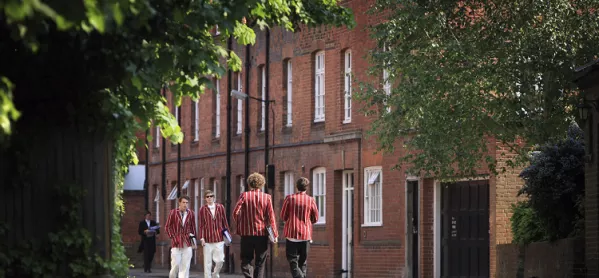- Home
- ‘Bashing private schools won’t bring education equality’
‘Bashing private schools won’t bring education equality’

“I don’t wake up every morning wishing your schools didn’t exist,” one state school head told her independent school head friend the other day. “I wake up wishing that I had the same funding and freedoms that you do.”
And who can blame her? Certainly not me, and certainly not those teachers who work in fee-paying schools. Decent resourcing, independent decision-making and a decent co-curricular programme are arguably the rights of all schools. A good education is certainly the right of all children.
However, in the absence of this being delivered by government – despite its £39 billion budget – frustration is being vented on independent schools. The difference between the two sectors is perceived as growing, as is the feeling that state school pupils are being unfairly disadvantaged. There is a general feeling that "something must be done".
Ed Dorrell is right to say that political pressure on us is mounting. We only have to consider the sudden imposition of a huge hike in employer pension contributions, the Labour Party’s election promise to put VAT on school fees and moves in Scotland to abolish business rates relief for independent schools to realise that. But far from "plummeting towards a crisis", we are rising to the challenge.
Let’s look at the evidence.
In just the past few years, independent schools have agreed the first-ever joint agreement with government to do more to assist state schools and open access. It’s easy to sneer at this, but it’s a historic moment.
The number of partnerships with state schools being reported (there will be many that aren’t) has risen by nearly a thousand over 12 months – with every HMC school taking part. These range from sharing teachers, facilities and expertise to sponsoring hugely successful academies and helping to train the next generation of teachers. The total value of means-tested bursaries and scholarships has increased by nearly £140 million since 2011, standing at £400 million a year, and we have offered to provide up to 10,000 more free-to-parents places every year for lower-income families if the Department for Education pays only what it would have cost for the children to attend a state school.
Political pressure on independent schools
Furthermore, the sector has pulled together to agree its first strategy for increasing and communicating its public benefit activities, and my organisation, HMC, is next week dedicating its first conference to planning how to contribute ever more effectively to state education and less well-off families. This is being taken extremely seriously.
At the same time, the Royal National Children’s Springboard Foundation now supports 465 children from disadvantaged backgrounds in over 60 boarding schools and the Boarding School Partnership is busy giving some of the most vulnerable children carefully managed boarding school places around the country. Pupils are having their lives transformed, going to Oxbridge and other Russell Group universities and on to whatever path they choose.
We are responding to increased political and societal pressures. But this is certainly not the only reason why our schools are increasing access and the help they give to state schools. Many independent schools have been quietly providing thousands of free places and free help to local state schools for years, and we should not forget that some were Direct Grant schools until the government abolished the scheme in 1976.
Perhaps we should ask ourselves why a sector that educates only 7 per cent of the population and delivers the benefits that we do, gets the bad press that Ed Dorrell refers to. While we recognise the anger of parents who cannot afford our fees, those fees are necessary to fund a first-class education. So, rather than penalise schools funded properly by paying parents, is it not up to government to ensure that it funds state education to similar levels?
Let’s be clear: hurting independent schools will not create equality of educational opportunity. Rather the opposite. We know that income, early years education, gender, ethnicity, home environment – not to mention tutoring and buying a more expensive home near a great school – all have a huge effect on children’s life chances.
Furthermore, financial penalties would inevitably drive up fees and lower numbers of free places, as most schools operate as not-for-profit on tight margins. Not to mention the fact that the many billions of pounds needed to educate the exiles from independent schools would make the chances of better per-pupil funding far more remote.
Is this all enough to win hearts and minds and avoid what Ed Dorrell calls “educational corrective surgery"? Who knows. We have listened to politicians and the public, and have responded with practical action. But will politicians and journalists want to hear that story? Who knows again.
Let’s all join the state school teacher and make a wish; for a properly funded state education system and an end to the fighting.
Mike Buchanan is executive director of the HMC
Register with Tes and you can read two free articles every month plus you'll have access to our range of award-winning newsletters.
Keep reading with our special offer!
You’ve reached your limit of free articles this month.
- Unlimited access to all Tes magazine content
- Save your favourite articles and gift them to your colleagues
- Exclusive subscriber-only stories
- Over 200,000 archived articles
- Unlimited access to all Tes magazine content
- Save your favourite articles and gift them to your colleagues
- Exclusive subscriber-only stories
- Over 200,000 archived articles



